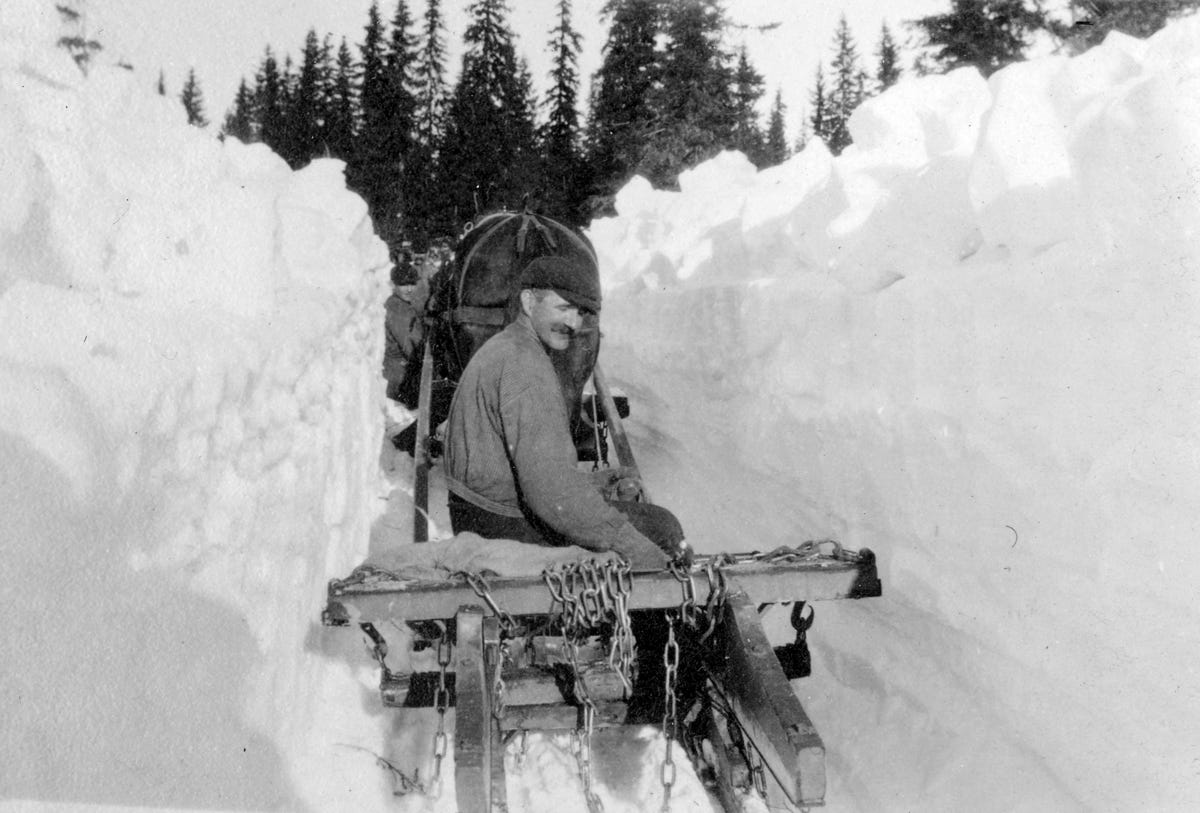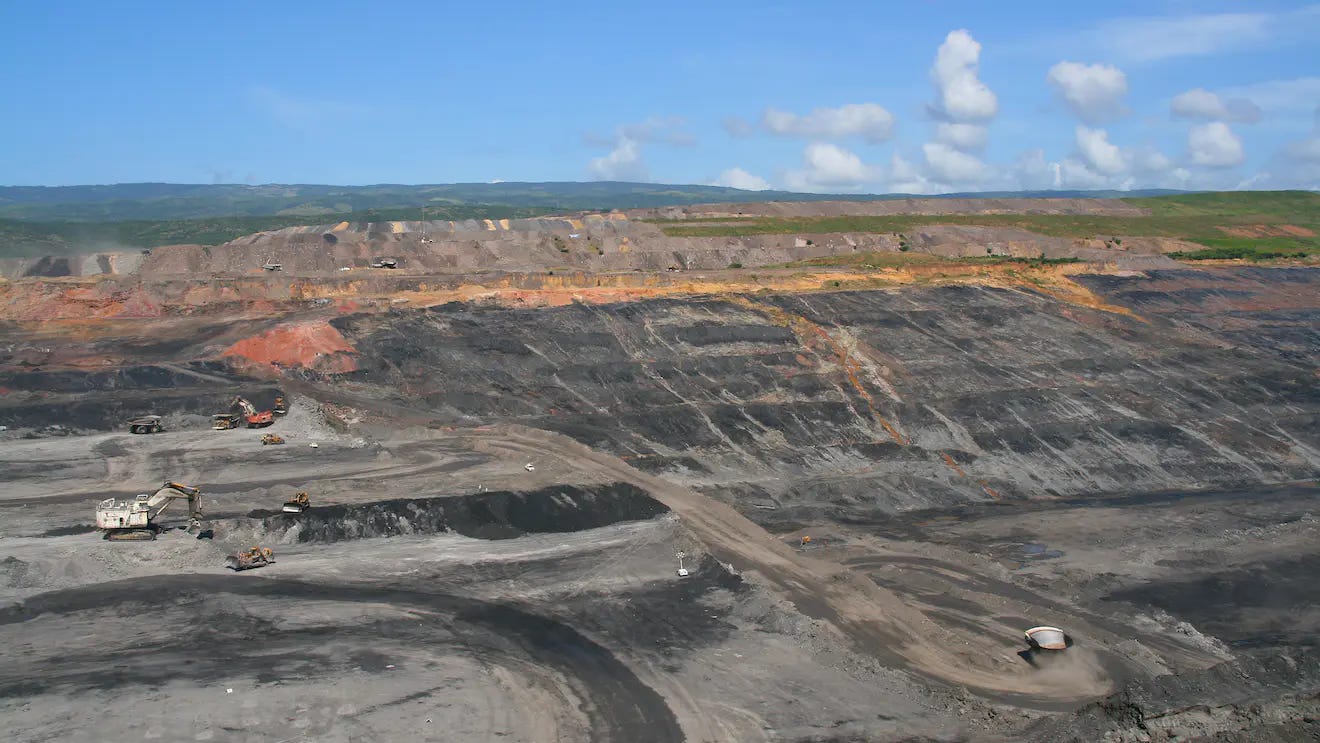Some derogatory thoughts about Norway and Niger
We have much to learn from history, but then we cannot let the politicians think for us.
This picture is from the time when Norway's population had to fend for themselves, without CO2 quotas, electric cars, and mobile phones. The picture is almost a hundred years old, showing how our ancestors laid the foundation for us to live a rich life in deep snow, even if the Tesla doesn't work. These days Norway is far worse off.
The winter of 1926/27 had an enormous amount of snow in Østerdalen. In this photo taken by Severin Skaret, we see Andreas Svendsen climbing in Kråksætermarka on Østre Åbu (Åsta east) in Åmot municipality, to fetch a new load of timber to be transported down to the Glomma river. The timber road and timber chutes had to be hand-shoveled before the timber could be transported with horses and sleds down to the ice on Glomma, later to be turned into paper and cellulose exported from the industrial cities along the border with Sweden.
The world has two poles, and up here under the North Pole, we've had a lot to think about in recent years. One thing is that the big world outside our cold, stony and snowy country seems to be boiling over with conflicts.
But, in order to think, you need something to think with, and it seems that in Norway, we have problems with just that.
In the last two days, we have learned that two of our ministers cheated on their Master's theses. Minister of Research and Higher Education (!) Sandra Borch (Centre Party) resigned on Friday. Minister of Health and Care Services Ingvild Kjerkol (Labour) has so far not admitted to cheating, and Prime Minister Jonas Gahr Støre (Labour) has, so far, protected her. Be that as it may. I also believe she must leave the government, if so, she’ll be the eighth minister to resign due to fiddling and what not in just over two years.
The new ministerial resignation(s) send the trust in Norwegian politicians, both those with and without stock-trading spouses, far into people's mental freezer. This fits well with the recent Arctic cold wave that sent climate-crazy politicians, bureaucrats, and media into panic mode.
Norwegian politicians must be among the world's dumbest. (I could have written among the world's worst, but with Biden and Netanyahu's genocide in Gaza, it takes something more to fall into that category.)
Let me share a bit of Norway's misery register first. Many Norwegian readers are familiar with this, but in the big world, this is almost unknown.
Norwegian carbon poisoning in Svalbard
After more than a hundred years of coal mining in Svalbard, Norwegian mining, with a few exceptions, is a thing of the past. The carbon resources formed 40 million years ago have, for Norway's part, been consigned to the scrap heap of history, and on October 19th last year, the world's northernmost coal-fired power plant shut down. CO2 must have gotten into the brains of Norwegian politicians.
Sometime in the future, if there is any, the smart climate goals in one of the world's largest oil companies, the former Norwegian Statoil, now renamed Equinor (without the Norwegian state getting any fewer shares for that reason), have proposed that coal should be replaced by energy-wasting and and life-threatening hydrogen (it takes more energy to convert natural hydrogen into energy-carrying hydrogen than it provides energy, and of course it’s highly flammable and explosive). But, for the time being, Svalbard get’s its electricity from diesel generators, and the diesel, well it’s imported from the mainland. Very clever, isn't it?
Since our Norwegian politicians are so busy following the globalists in Davos and on Wall Street, this transition to zero CO2 emissions in Svalbard has, of course, resulted in increased electricity bills for those who live and work there:
The transition from coal to diesel in Longyearbyen costs 100 million NOK (approx 10m USD) more per year than estimated. The local government sent this bill to four large state-owned companies. (Teknisk Ukeblad)
When you can read (probably not in mainstream media, i.e., state-supported and controlled press) that Norway instead imports "blood coal" from Colombia, it all seems even smarter. Yes, you read that right:
Child labor and fatal accidents: Norwegian industry buys "blood coal" from Colombia
More than half of the coal imported to Norway comes from disputed mines in Colombia. (Fri fagbevegelse and FIVH)
The El Cerrejón field in Colombia, with its 690 km2, is the tenth-largest mine in the world (15 times larger than Gaza) and is owned by Swiss Glencore PLC. Paradoxically, the Norwegian Sovereign Oil Pension Fund decided in 2020 to exclude the company from the Government Pension Fund Global. Photo: Tanenhaus/Wikimedia Commons
Svein Jonny Albrigtsen is a miner and leader of the Labour Party on Svalbard. He believes the industry could have bought coal from Store Norske in Svalbard instead.
"We sell coal to Germany today, which goes to the metallurgical industry. It is the purest coal in the whole world. The Germans want our coal because it is of high quality and contains little sulfur," Albrigtsen tells Fri fagbevegelse.
Svalbard is not Norwegian property, even though many in Norway, including politicians, believe it. The Svalbard Treaty of 1920 grants rights to a total of 45 countries, including Saudi Arabia, North Korea, Afghanistan, Egypt, and the Dominican Republic, all of which have signed the treaty. It is quite unlikely that Taliban warriors or Caribbean waiters will establish any business in Svalbard, but our big neighbors to the east, Russia and China, have since long been in business there. To think that Svalbard and the Arctic are not of interest to these two superpowers is overly naive, especially one takes BRICS and the emergence of a multipolar world (a world where the USA and the West no longer dictate alone) into consideration.
Even before Russia started its Special Military Operation against Ukraine, that is, before they were literally pushed into the cold, Russia protested against the way they are treated by Norway:
Russia flatly states that they believe Norway is violating the terms of the important agreement guaranteeing Norwegian sovereignty over Svalbard. (NRK, 02.21.20)
I do not fear Russia's ambitions in Svalbard. They are still extracting coal there, but while the economy in Norway had at best zero growth in 2023, Russia's economy grew by over 3.1 percent last year. The sanctions that were supposed to sink Russia and help Ukraine turned out to do the opposite.
From Svalbard to Niger
Why involve Niger in an article about Norway's foolishness? Well, before I get to the point, I just have to mention that Norway and Niger have one important thing in common: we are both major suppliers of energy to Europe. Norway has oil, gas, and hydropower, while Niger has uranium. However, where Norway is a stone-rich and cold country just below the North Pole, Niger is a desperately poor and blazing hot country just north of the equator.
Why do most Norwegians live in prosperity and most Nigerians in poverty? The answer is found in France's more than 50 years of exploitation of Niger's uranium deposits near Arlit to secure fuel for their nuclear power plants (and weapons). Ragnhild Gylver visited the area in 2014. Here is from her article in Panorama:
- The companies' ownership of all the wells in Arlit, and the massive consumption of water (20 million cubic meters per year, according to Aïr Info) alongside a population in parts of the city suffering from permanent water scarcity.
- The tendency to hire labor instead of employing it (subcontracting) and the lack of rights for these temporary workers.
- The uncertainty about the health effects of millions of tons of radioactive waste dumped outdoors just five kilometers from the city.
- The difficulties of getting work-related illnesses among miners recognized (a so-called 'health observatory' to document illnesses was established in 2010, with civil society as the driving force).
- Last but not least: The lack of transparency and insight into the mining industry in Niger; Areva's general unavailability to the population and state actors on anything other than the highest level.
Niger has been one of the world's largest exporters of uranium for years. The French can thank Niger for not freezing, but uranium has not enriched Niger. More than 60 percent of the country's 25 million people survive on less than $1 a day.
Fifty years of uranium extraction in Niger by subsidiaries of the French nuclear company Areva – the world's leading civilian nuclear consortium until it was dismantled – is illustrative. Areva's sales have consistently surpassed Niger's GDP, and Niger's mines have always been considered strategic by the company, even after the diversification of supply countries. Niger's uranium has contributed to a third of the electricity produced by French nuclear power plants and has played a significant role in keeping it among the world's leading economic powers. To this day, France is 100% dependent on Niger's uranium for its military nuclear power.
Among the world's three poorest countries, Niger has only benefited from around 12% of the market value of the uranium produced, scoring the worst human development indicators in health, education, malnutrition, and infant mortality. As one of many examples, most Nigerians still do not have access to electricity, which is still largely imported from neighboring Nigeria. (THE FRANÇAFRIQUE: UNVEILING ANTI-FRENCH SENTIMENTS AND FRANCE'S COMPLEX ROLE IN AFRICA.)
Contaminated water in a country on the edge of the Sahara has led Niger to turn to Russia. Photo: African Arguments
Whether dissatisfaction with France was the cause of last summer's military coup in Niger, I cannnot say for sure. But even though French is still the official language, the ambassador and five thousand French soldiers have been expelled from the country. And this week, the country's new prime minister visited Russia.
– Niger is well positioned to say today that we expected a lot from cooperation with some [Western] countries. Unfortunately, expectations were not met. I will even say [it was a] disappointment, Niger's Prime Minister Ali Mahamane Lamine Zeine told Sputnik Africa.
Then it's just great that Norway, which barely has the capacity to guard its own coast (The Coast Guard cut millions – added five ships to the docks), together with the United Kingdom (which also does not have full control of its vessels), will help Ukraine build coastal and maritime defense.
– The UK, Norway, and other countries will help Ukraine strengthen security along the coast and at sea. Ukraine will receive support to build a lasting maritime capacity, says Minister of Defence Bjørn Arild Gram (Centre Party). (Regjeringen.no)
Maybe Norway plans to help Ukraine retake Sevastopol and Crimea..?
Too much snow and too little CO2 for Norwegian (and Western) politicians.
Soldier from the Intelligence Battalion on skis. Photo: Ole-Sverre Haugli/ Norwegian Army
---
My apologies for making such a long post. I shall try to improve!







